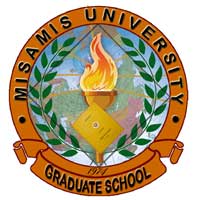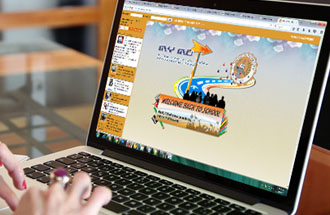
Vision
A prime learning center of advanced studies for education, nursing, business and public administration and management.
Mission
To develop professionals who can lead, manage and innovate education, nursing, business and public services and practices.
Degree Programs and Program Educational Objectives
Doctor of Education (Ed.D.) major in Educational Management
A. Introduction
Misamis University’s Doctor of Education Program aims to develop capacities of teachers and other education professionals for developing new knowledge and strategies in teaching, learning and educational management. The program focuses on the development and validation of new theories, models, programs and practices of educational processes.
B. Program Educational Objectives. The Doctor of Education Program aims to produce graduates who:
- Possess expert level of theoretical knowledge in education and educational leadership and management;
- Demonstrate competence to solve different problems related to educational practice and management; and
- Apply skills to undertake independent research to develop and evaluate complex educational programs and systems and communicate the results and implications to diverse audiences.
Doctor in Management (D.M.) Program
A. Introduction
Misamis University’s Doctor in Management Program is flexibly and comprehensively structured covering a wide scope of core, foundation and specialization courses. Management practitioners and academic faculty are trained in the framework and strategic implications of business and government management concepts in accordance to MU quality instruction, research competencies and credibility. The program is a practitioner’s degree founded on practical and “hands-on” applications of the discipline in actual industrial, business and government setting.
The Doctor in Management Program is designed to train professionals from industry, business, government and the academe as they pursue higher academic and practical learning of supervision, administration, supervision and management. Having equipped them with the basic/core principles of the discipline, as well as, the practical, current and emerging applications of their specialized field/area of concentration, these professionals are made competent, value-driven and ready to innovate, lead and excel in their respective organizations in the industry, business, government or academe.
B. Program Educational Objectives
The Doctor in Management Program aims to produce graduates who:
- Possess theoretical and practical knowledge-base needed to create organizational solutions and change processes;
- Demonstrate competence and motivation to apply leadership and development management models in the diverse and global business and public environment; and
- Apply research skills to design, conduct and evaluate projects using appropriate measurement tools.
Master of Arts in Education (MAEd) Program
A. Introduction
The program develops the competencies of classroom teachers and other education professionals to undertake research in teaching-learning practices. It focuses on replication, verification, validation, contextualization, and/or application of theoretical knowledge about educational processes.
B. Program Educational Objectives
The Master of Arts in Education Program aims to:
- Enrich teachers’ content knowledge in English Language Teaching, Filipino, Mathematics Education, Guidance and Counseling and Educational Management;
- Enhance and expand teachers’ theoretical and technical knowledge in teaching and managing educational setting; and
- Develop the teachers’ research capabilities for replicating and contextualizing theories and models of educational processes.
Master of Arts in Nursing (MAN)/Master in Nursing (MN) Program
A. Introduction
The Master of Arts in Nursing Program is designed to prepare professional nurses for specialization and leadership in the areas of maternal and child nursing, community health nursing and nursing education administration. It focuses on enhancing the expertise, experience, and skills of the professional nurse in nursing theory and practice and nursing research for problem solving and health policy.
B. Master of Arts in Nursing (MAN) - Program Educational Objectives
The Master of Arts in Nursing Program has for its objectives of producing graduates with the following competencies:
- Demonstrate ethical practice, personal responsibility, and continuing professional growth in an advanced practice role;
- Implement the research process within the context of evidence-based practice as a producer and consumer of research evidence to contribute to nursing theory and improve nursing practice;
- Apply leadership principles to effect change in health care and health policy on local, regional, national and international levels;
- Integrate the ethical use of technology and information systems to augment the human capacity for health, facilitate decision-making, support collaboration and foster communication;
- Promote health of local to global communities through promoting safe environments and safe and effective health care addressing the interaction among individuals, communities and their environmental contexts;
- Disseminate nursing knowledge to professionals within the health care system to improve health care outcomes for individuals, families and communities; and
- Practice entrepreneurship related to one’s field of specialization.
C. Master in Nursing (MN) - Program Educational Objectives
The Master in Nursing Program has for its objectives of producing graduates with the following competencies:
- Demonstrate competence in advanced nursing practices with focus on nursing interventions and evaluation of outcomes for defined clients;
- Gain in-depth training, knowledge and research experience to prepare for career possibilities in nursing practice;
- Possess knowledge and skills to analyze and evaluate programs, policies and environmental issues, organizational structures related to nursing;
- Exhibit a commitment of excellence in nursing practice and for the advancement of the nursing discipline; and
- Apply the legal, ethical and financial accountability in the nursing practice and within various environmental contexts.
Master in Business Administration (MBA) Program (Thesis Track and Non-Thesis Track)
A. Introduction
The Master of Arts in Business Administration (MBA) program is designed for mid-career professionals. The focus of this program is for the business professionals to enhance their leadership and managerial skills and realize their career and organizational goals.
B. Program Educational Objectives
The Master in Business Administration Program aims to develop the following competencies among its graduates:
- Demonstrate the ability to realize their full potential and career goals;
- Demonstrate leadership and managerial skills, and exhibit advanced knowledge relating to professional business designations;
- Gain understanding of the major facets of business operations, theoretical foundations of business, and quantitative controls;
- Exhibit social and ethical behavior in the environment of business and in society in general; and
- Conduct researches and integrate findings to broaden and advance management careers.
Master in Public Administration (MPA) Program (Thesis Track and Non-Thesis Track)
A. Introduction
The Master in Public Administration (MPA) program prepares professional to serve as office heads or managers in the local government units (LGUs) or in the local and national government agencies (GAs), nongovernmental organizations (NGOs)’ nonprofit sectors and other organizations/agencies that engage in public services and administration.
B. Program Educational Objectives.
The Master in Public Administration Program aims to develop the following competencies among its graduates:
- Exhibit theoretical and technical skills in policy analysis, quantitative analysis, qualitative analysis, budgeting and public management;
- Put importance on the role of public service to society
- Possess a thorough understanding of the political processes that influence government decision making locally and internationally;
- Exhibit a strong set of interpersonal skills and experience in group work especially in public workplace; and
- Show appreciation of the role of public policy research in shaping current and future policy decisions.







